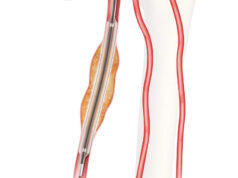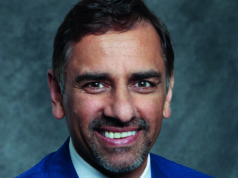
The vascular surgery field received a rare moment in the public spotlight recently as President Donald J. Trump was diagnosed with chronic venous insufficiency (CVI). The White House press secretary and appointed physician to the president even made statements on this condition, noting it as a “benign” cause of swelling/bruising in the legs and “common in people over 70.” Suddenly, articles addressing the causes and symptoms of CVI appeared on every major news outlet, including CNBC, CNN and the New York Times. The American Heart Association publicly addressed this issue on its website in an effort to bring reliable, evidence-based perspectives on CVI to the forefront.
This is not the first-time vascular pathologies have had a public spotlight. In 2016, actor Alan Thicke unfortunately passed away from complications related to an acute aortic dissection. Many of the articles reporting his death linked to the John Ritter Foundation for Aortic Health, founded in honor of another actor (John Ritter) who passed away from a thoracic aortic dissection in 2003. In cases such as these, conscious media efforts to highlight serious medical conditions (which are often directed by family/friends of the affected high-profile figure) can offer productive public discussions that may be able to reach an affected patient who would be otherwise unaware of their medical risks.
Actress Phylicia Rashad (otherwise known as Claire Huxtable from The Cosby Show) has been outspoken about her diagnosis of peripheral arterial disease (PAD). She has even taken part in a campaign co-sponsored by the PAD Coalition as a part of National PAD Awareness Month. Her efforts go above just simply raising awareness for those who consume popular culture media; her high-profile status also brings engagement with a nationally recognized, non-profit organization.
There can be a downside to the “media frenzy” that accompanies the spotlight for celebrity diagnoses. For example, a private vein clinic website has an article published to their website reporting “celebrities who have suffered or died from varicose veins & DVT [deep vein thrombosis].” But not a single celebrity listed died from complications from their varicose veins. Predatory practices can take advantage of the public’s inability to distinguish specific conditions that fall under a similar umbrella pathology (i.e. DVT versus varicose veins) to promote their interventional practice. If a celebrity almost died from this condition, shouldn’t I get my varicose veins fixed? Though this sounds absurd between vascular colleagues, it can undermine the efforts of our field to provide appropriate care.
In short, the surge in CVI interest from President Trump’s recent statements offers an opportunity for the public to educate themselves on a medical condition and can, in turn, profit the providers that evaluate/ manage these vascular conditions (i.e. vascular surgeons).
However, it is important for vascular surgeons and non-profit medical societies to guide this awareness to evidence-based literature, best practice advisories or non-profit foundations that do not gain from increased treatment interest.
Without conscious signaling from vascular experts on the most appropriate pathways to manage these conditions, the public can fall victim to those engaged in predatory practices that use “surges in awareness” to capture newly concerned but poorly informed patients.
References:
- What Is Chronic Venous Insufficiency? Trump’s Diagnosis, Explained. Time. time.com/7303280/what-is-chronic-venous-insufficiency-trump/. 17 July 2025
- What Is Chronic Venous Insufficiency? American Heart Association. newsroom.heart.org/news/what-is-chronic-venous-insufficiency. 17 July 2025
- Experts: Uncommon condition killed Alan Thicke. USA Today. usatoday.com/story/life/nation-now/2016/12/23/experts-uncommon-condition-killed-alan-thicke/95807532. Dec 23 2016
- Cosby Star Tackles a Silent Heart Threat. ABC News. abcnews.go.com/Health/Healthday/story?id=4508727&page=1. March 24, 2008
Saranya Sundaram, MD, is Vascular Specialist’s resident/fellow editor. She is a vascular surgery resident at Medical University of South Carolina in Charleston.












